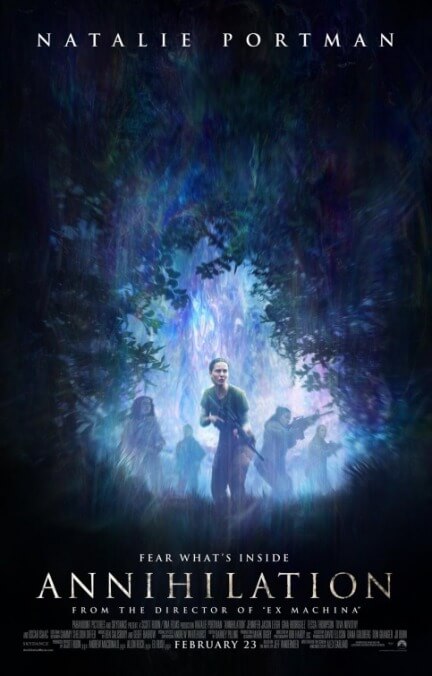Alex Garland's Annihilation is weirder, wilder, and much scarier than Ex Machina

Years from now, someone’s going to stroll down the science-fiction aisle of the last remaining video store on the planet, where they’ll find the last remaining physical copy of Alex Garland’s new movie, Annihilation, shelved neatly between Aliens and Arrival. It will be exactly where the film belongs, and not just alphabetically. Garland, the novelist-turned-filmmaker who wrote and directed Ex Machina and also penned the screenplays for Danny Boyle’s 28 Days Later and Sunshine, tends to split the difference between cerebral and visceral, between a “hard” sci-fi of ideas and a slam-bang sci-fi of quickening pulses. Usually, that demarcation line is drawn somewhere around the third act, when the lizard part of Garland’s brain suddenly takes over, transforming an intriguing space odyssey, let’s say, into an intergalactic slasher movie. But in the ominous, derivative, sporadically frightening Annihilation, the brainy and brawny halves of his regular genre equation have been woven so tightly together that there’s no clean way to separate them. He’s made a ’50s-shlock, forbidden-planet monster movie in the key of Solaris.
If nothing else, Garland possesses a gift for baiting the imagination; his narratives ooze with possibility, pulling you in with their clammy tendrils of intrigue. In Annihilation, the filmmaker manifests that glowing nucleus of mystery that powers so many of his films into an actual physical space. They call it The Shimmer: a translucent, purple-tinted bubble of energy that’s swallowed a stretch of Florida coast whole, and which seems to be expanding by the day. The government has set up a research facility, Area X, on the outer edge of the phenomenon, sending in exploratory units to investigate, but what goes in doesn’t tend to come out. Having mainly thrown soldiers at The Shimmer, Dr. Ventress (a spookily aloof Jennifer Jason Leigh) spearheads a new approach, leading an all-female team of scientists into the mystery zone. What they find on the other side is a treacherously changed wilderness, where all plant and animal life has entered a state of constant mutation. But are the monsters the real threat? Or will the paranoia get to them first?
The expedition crew is the usual mix of personalities: the hardened-by-grief survivor (Tuva Novotny), the detached professional (Tessa Thompson), the token hothead (Jane The Virgin’s Gina Rodriguez). But our main eyes and ears on the ground belong to Lena (Natalie Portman), a biologist from Johns Hopkins University, harboring a secret personal stake in the mission. She’s there to find out what happened to her active-duty husband, Kane (Oscar Isaac, in a much more subdued performance than the one he delivered in Ex Machina), who went MIA for months, only to return… different somehow. He was in The Shimmer, of course, and it’s here that sci-fi fans may start to recognize the phantom impression of Andrei Tarkovsky’s deep-think genre classics, films like Solaris or Stalker, the latter similarly concerned with the traversing of a mysterious realm. Technically, Annihilation has been pulled from the pages of a Nebula-winning novel by Jeff VanderMeer, the first of a trilogy. But the adaptation is loose and streamlined, Garland chiseling the source material into a pastiche of secondhand sci-fi tropes, some lifted from his own work. Given that the twisty slow-burn plot hinges on “something making splashes in the gene pool,” perhaps it’s appropriate that the film feels like a hybrid itself, roping together DNA strands of multiple genre specimens.
There’s a tractor-beam fascination to the storytelling. It gets you hooked on the promise of some big-bang revelation, on the trust that its enigmatic parts will blow minds when they finally cohere. With Garland, that can be a sucker bet: He’s much better at setting up intriguing premises than paying them off—even, it would seem, when operating from someone else’s blueprint. But Annihilation often works on a more primal level. The film wages war on the nerves across multiple fronts, creating a state of regular disorientation through its scrambled visual grammar (like the mismatched eyelines during Lena’s bewildered first scene at the compound) and the distant remove of most of the performances, Portman’s included. As a pure creature feature, it has individual images and moments straight out of a wake-in-fright nightmare. There is, for one hideous example, a particular mistake of fast-forward evolution that absorbs the death knells of its screaming victims, as though its toothy maw were a pit straight to hell. H.R. Giger would be proud/petrified.
Making their way across the transformed landscape, inexorably drawn to a pale symbolic lighthouse at the epicenter of the occurrence, the besieged scientists come to understand The Shimmer as an oversized, ever-expanding prism. That makes it an ideal metaphor for science fiction itself, a genre that refracts big notions through impossible, out-there conceits. If Ex Machina was a mess of provocative, half-formed thoughts on gender, creation, and desire, Annihilation locates something closer to a clear, cogent thesis: that there’s nothing scarier than looking at those closest to you, or even yourself, and not recognizing the person staring back. That idea might possess real emotional kick if Garland actually invested in Lena’s relationship (some brief flashbacks can’t shoulder that weight alone), or resisted drowning every scene in Tarkovsky torpor. But at least he finally devises an ending, different from the book’s, that doesn’t abandon the ideas in favor of carnage; love or hate the down-the-wormhole final minutes, there’s no denying that Annihilation follows through. It’ll also sit fine down the shelf from 2001 in the sci-fi section of tomorrow.